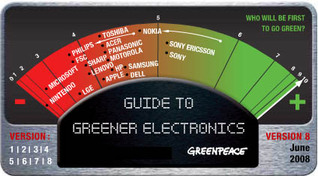 Greenpeace has just issued its annual electronics guide that focuses specifically on e-waste and climate change. According to the report, consumers can make their money matter by favoring the mobile phone, computer, TV and games console manufacturers that have the best policies and practices on toxic chemicals and equipment take-back. Consumers can also favor electronics companies that do the best job reducing their climate change impact.
Greenpeace has just issued its annual electronics guide that focuses specifically on e-waste and climate change. According to the report, consumers can make their money matter by favoring the mobile phone, computer, TV and games console manufacturers that have the best policies and practices on toxic chemicals and equipment take-back. Consumers can also favor electronics companies that do the best job reducing their climate change impact.
According to the Greenpeace website, “Companies are scored on disclosure of their greenhouse gas emissions, commitment for absolute cuts in their own emissions and support for the mandatory global emissions reductions that are needed to tackle climate change. On energy efficiency, a selection of each company’s product range is assessed to see how far they exceed the current de-facto global standard, the US Environmental Protection Agency’s Energy Star. Energy Star sets minimum standards for energy efficiency for many types of electronic products. The overall percentage of renewable energy in a companies total energy use is also assessed.
The climate impact is important, since the information and communications technology sector currently accounts for two percent of global greenhouse gas emissions, equal to the aviation industry. Notes Greenpeace, “As one of the most innovative and fastest growing industries, the biggest electronics companies must show leadership in tackling climate change by reducing both their direct and indirect climate change footprint.”
Which Company Generates the Most E-Waste?
Philips scores well on chemicals and energy criteria, but scores a zero on e-waste since it has no global take-back polices. Greenpeace recommends that Philips establish an effective global take-back program to reduce the environmental impact of its e-waste.
 The best performers on energy efficiency are Sony Ericsson and Apple, with all of their models meeting, and many exceeding, Energy Star requirements. Sony Ericsson stands out as the first company to score almost top marks on all of the chemicals criteria. With all new Sony Ericsson models being PVC-free, the company has also met the new chemicals criterion in the ranking, having already banned antimony, beryllium and phthalates from models launched since January 2008.
The best performers on energy efficiency are Sony Ericsson and Apple, with all of their models meeting, and many exceeding, Energy Star requirements. Sony Ericsson stands out as the first company to score almost top marks on all of the chemicals criteria. With all new Sony Ericsson models being PVC-free, the company has also met the new chemicals criterion in the ranking, having already banned antimony, beryllium and phthalates from models launched since January 2008.
On the other hand, according to the Greenpeace analysis, Apple “missed a big chance” to advance its score by not improving the environmental performance of the new version of the iPhone.
![]() Some companies that promote their “green” policies come up short when measured against global standards of measuring impacts on climate change. Dell scored relatively poorly and Toshiba, Samsung and LGE scored close to, or zero, on climate change criteria.
Some companies that promote their “green” policies come up short when measured against global standards of measuring impacts on climate change. Dell scored relatively poorly and Toshiba, Samsung and LGE scored close to, or zero, on climate change criteria.
Among the games console makers, Microsoft dropped to second bottom of the Guide with a low score on climate criteria. Nintendo’s score increased slightly over last year with some improvement on toxic chemicals and climate policy. However, even Nintendo’s relatively energy efficient Wii console does not meet Energy Star standards that cover minimum energy efficiency standards for PCs and consoles.
Notes Greenpeace, with most companies now scoring less than 5/10, only a company that phases out toxic chemicals, increases the recycling rate of e-waste, uses recycled materials in new products and reduces its impact on climate change can seriously hope to make the claim of being green. Companies that undergo life-cycle analysis of their entire production, distribution, and reclamation policy have the best shot at meeting this goal.
Read a snapshot of the report here.
Or peruse the full Guide to Greener Electronics report.


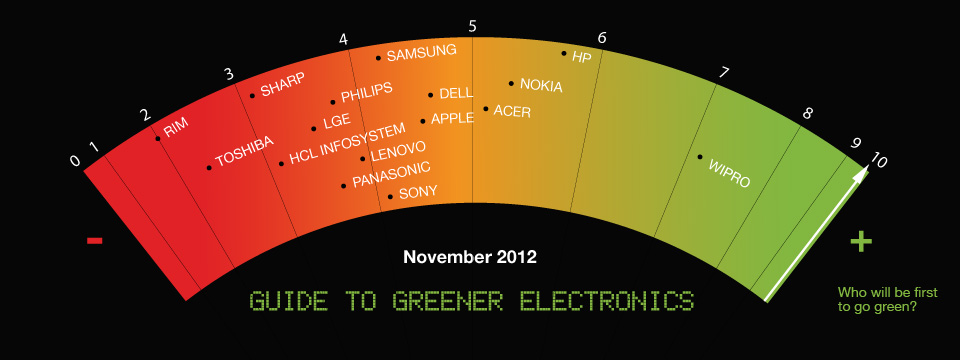


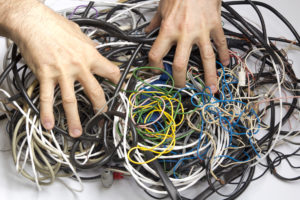
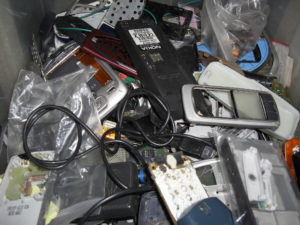

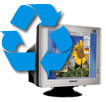








4 thoughts on “Best Electronics Create Least E-Waste, Climate Change”
Hey there, great post. I know how hard it is getting word on the street about helping to fight Global Warming, however on my site there is a way you can beat Global Warming and the recession too. Thanks for the update, I’ll bookmark this for later 🙂
Seb
This is really cool! I have been looking for the best electronics online that I can find. My husband is really big into electronics and his birthday is coming up and I have been looking for some things he may want. Does anyone have any advice?
What does your husband need/want? At this point, most products are rated for energy efficiency and can be recycled.
Thanks for the post, and I’m wanting to be more green with my technology usage. And I found http://storelocator.bell.ca electronic store, what are your thoughts on them?